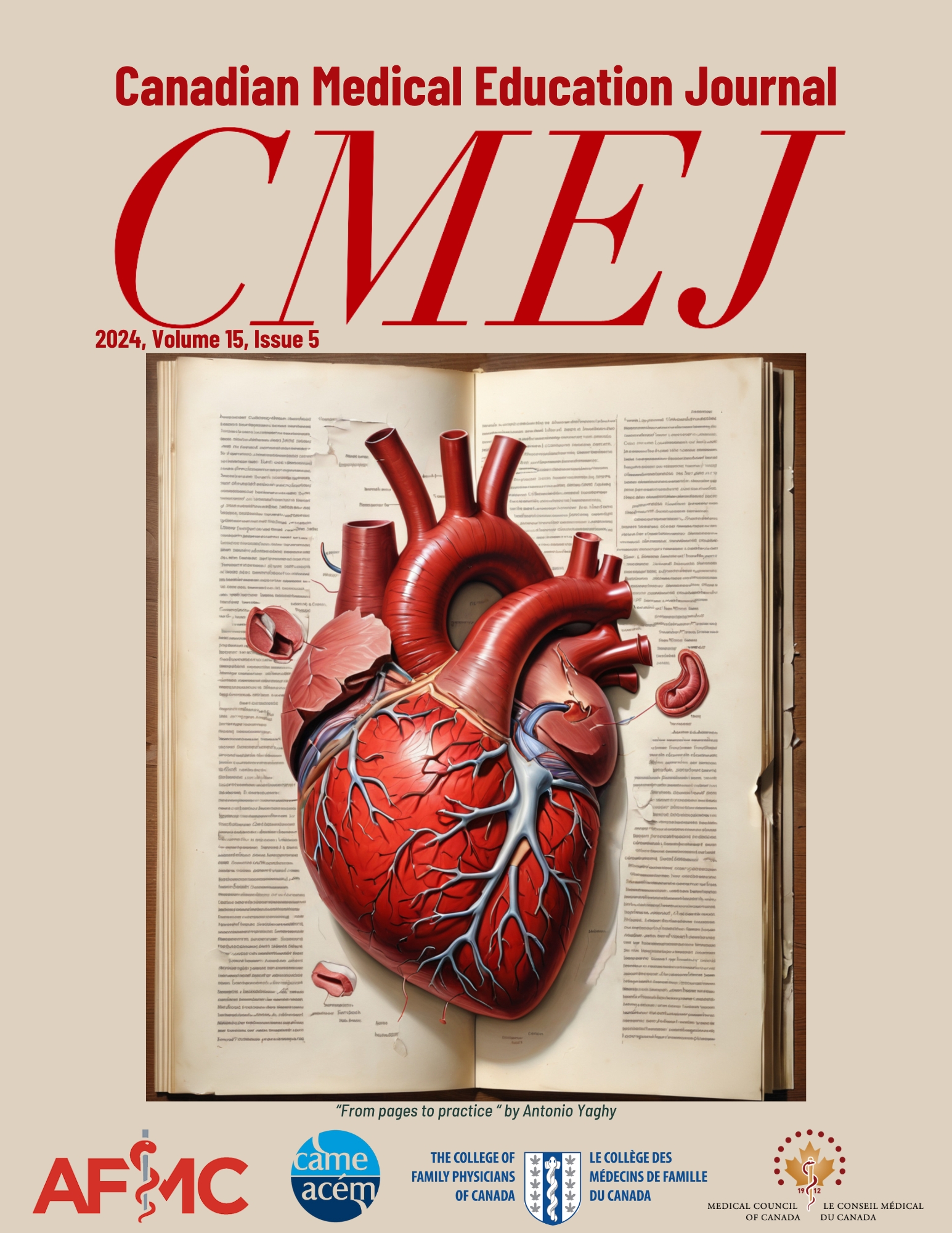Considerations for continuing professional development in the post-pandemic era: national experiences from psychiatry
DOI:
https://doi.org/10.36834/cmej.77048Abstract
Introduction: COVID-19 led to rapid innovations in continuing professional development (CPD). We surveyed Canadian Psychiatry CPD directors to understand the pandemic’s impact and to identify effective practices.
Methods: In fall 2021, an online 31-item survey was created iteratively based on discussions among CPD educators and disseminated to CPD program leaders at 17 Canadian medical schools through the Council of Psychiatry Continuing Education (COPCE). We collected information on each CPD program, adaptations associated with pandemic restrictions, and intentions regarding future delivery of CPD.
Results: Nine responses were received. COVID-19 led to a shift to virtual CPD delivery, with creative and transformative strategies to maintain engagement and online security. Virtual CPD was associated with an increase in attendance and decrease in costs. Many respondents anticipated that virtual or hybrid modalities would continue post-COVID-19.
Conclusion: The pandemic led to a pivot to virtual delivery of Psychiatry CPD programming. Hybrid delivery will likely be the prevalent mode of future CPD programming, requiring more technological, financial, and human resources to tackle potential challenges. In times of rapid adaptation, a national network of CPD directors can provide an important venue for knowledge exchange about innovations and effective practices and build capacity of expertise.
References
Mack HG, Filipe HP. Clinical teaching of CPD during the COVID pandemic. Clin Teach. 2021;18(1):84-86. https://doi.org/10.1111/tct.13261
Tarchichi TR, Szymusiak J. Continuing Medical Education in the time of social distancing: the case for expanding podcast usage for continuing education. J Cont Educ Health Prof. 2021;41(1):70-74. https://doi.org/10.1097/CEH.0000000000000324
Sklar D, Yilmaz Y, Chan TM. What the COVID-19 pandemic can teach health professionals about Continuing Professional Development. Acad Med. 2021;96(10):1379-1382. https://doi.org/10.1097/ACM.0000000000004245
Thomas PA, Kern DE, Hughes MT. Curriculum Development for Medical Education : A Six-Step Approach. 4th ed. Baltimore: Johns Hopkins University Press; 2022.
Kimmons R, Graham C, West R. The PICRAT model for technology integration in teacher preparation. Contemp Issues Technol Teach Educ. 2020;20(1):176-198
MacNeill H, Masters K, Nemethy K, Correia R. Online learning in Health Professions Education. Part 1: Teaching and learning in online environments: AMEE Guide No. 161. Med Teach. 2023 Apr 24:1-14. https://doi.org/10.1080/0142159X.2023.2197135
Kawczak S, Fernandez A, Frampton B, et al. Observations from transforming a Continuing Education programme in the COVID-19 era and preparing for the future. J Euro CME. 2021;10(1):1964315. https://doi.org/10.1080/21614083.2021.1964315
Harissi-Dagher M. COVID-19 and continuing professional development: an opportunity for inclusion. Can J Ophthamol. 2021;56(1):2-3. https://doi.org/10.1016/j.jcjo.2020.12.012
Moyle A, Ross S, Jones M, Zhou J, Fitzpatrick C, Richardson D. Education Hour: online sexual health continuing professional development during the COVID-19 pandemic provides opportunities and inclusivity. Sex Trans Infect. 2021;97(5):391. https://doi.org/10.1136/sextrans-2020-054872
Cheng C, Papadakos J, Umakanthan B, Fazelzad R, Martimianakis MA, Ugas M, et al. On the advantages and disadvantages of virtual continuing medical education: a scoping review. Can Med Educ J. 2023;14(3):41-74. https://doi.org/10.36834/cmej.75681
Attenborough P, Towns J, Fazalbhoy A, Fitzgerald K. Clinical assessment during a global pandemic - Transitioning to a COVID safe hybrid OSCE. Intern J Osteo Med. 2021;42:1-4. https://doi.org/10.1016/j.ijosm.2021.10.004
Rao S, Chowdhury N, Naithani M, et al. Alternative strategy adopted in practical assessment for pathology postgraduate certification examination amidst COVID-19 nationwide lockdown: an Indian experience with a novel hybrid method of assessment. Adv Med Educ Pract. 2021;12:1-9. https://doi.org/10.2147/AMEP.S286423
Smith M, Rumoro A, Staffileno BA. Favorable Outcomes: Moving nursing orientation to a hybrid program during the COVID-19 pandemic. J Nurses Prof Dev 2022;38(1):E5-E11. https://doi.org/10.1097/NND.0000000000000833
Han JK, Baykaner T, DeSimone CV, et al. Virtual transformation and the use of social media: cardiac electrophysiology education in the post-COVID-19 era. Curr Treat Options Cardio Med. 2021;23(11):70. https://doi.org/10.1007/s11936-021-00948-9
Downloads
Published
Versions
- 2024-11-12 (2)
- 2024-10-17 (1)
Issue
Section
License
Copyright (c) 2023 Lara Hazelton, Certina Ho, Owen Connolly, Christy Mak, Eulaine Ma, Wei Wei, Heather E McNeely, Heather Milliken, Rajeevan Rasasingham, Sanjeev Sockalingam

This work is licensed under a Creative Commons Attribution-NonCommercial-NoDerivatives 4.0 International License.
Submission of an original manuscript to the Canadian Medical Education Journal will be taken to mean that it represents original work not previously published, that it is not being considered elsewhere for publication. If accepted for publication, it will be published online and it will not be published elsewhere in the same form, for commercial purposes, in any language, without the consent of the publisher.
Authors who publish in the Canadian Medical Education Journal agree to release their articles under the Creative Commons Attribution-Noncommercial-No Derivative Works 4.0 Canada Licence. This licence allows anyone to copy and distribute the article for non-commercial purposes provided that appropriate attribution is given. For details of the rights an author grants users of their work, please see the licence summary and the full licence.











